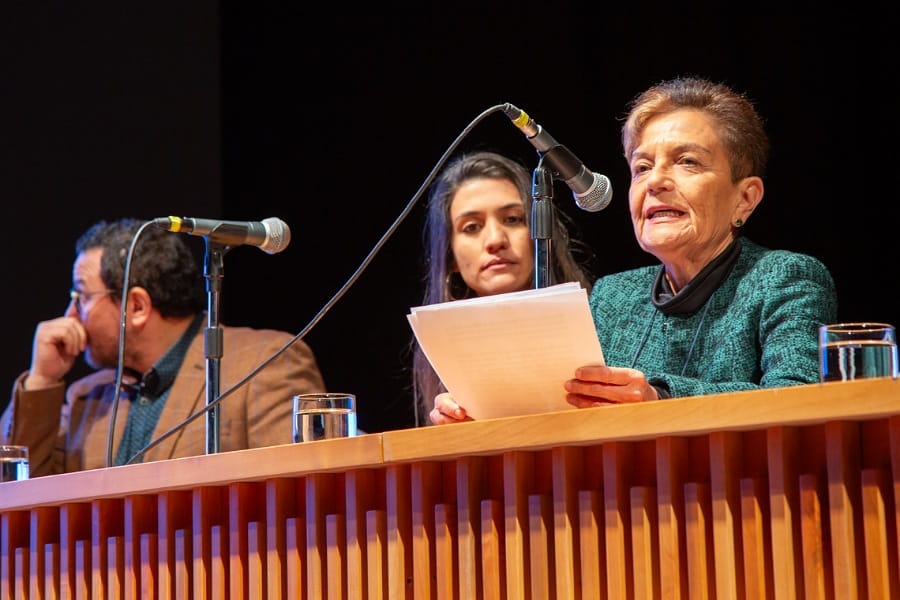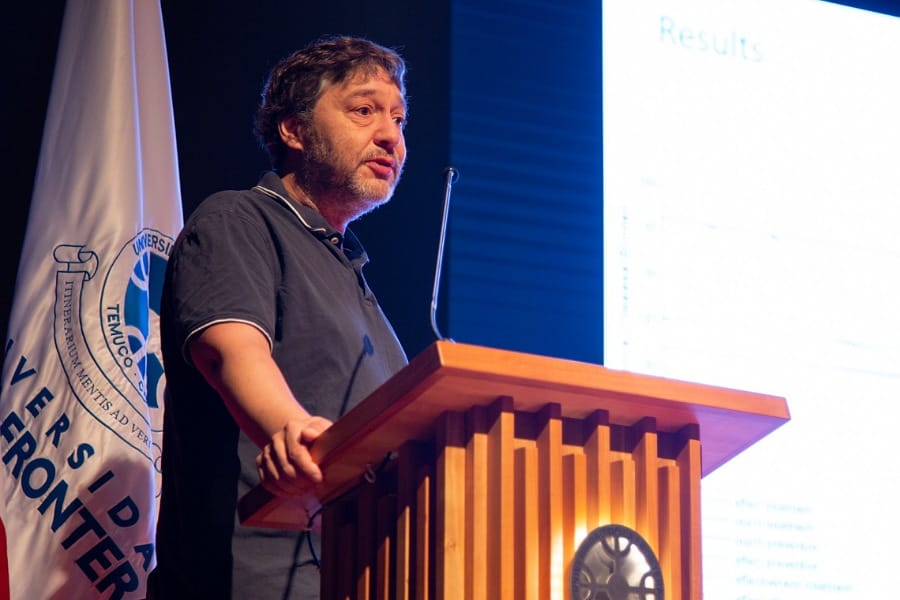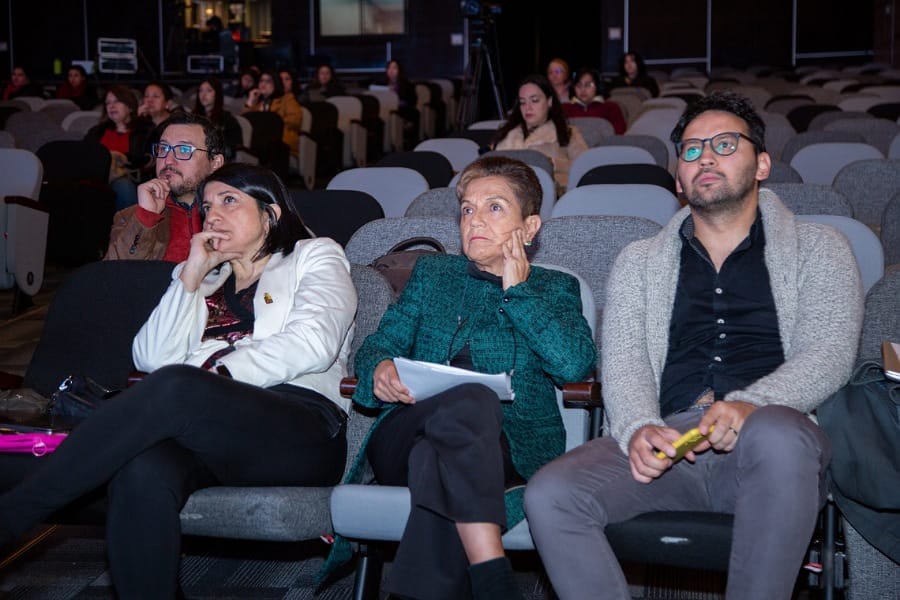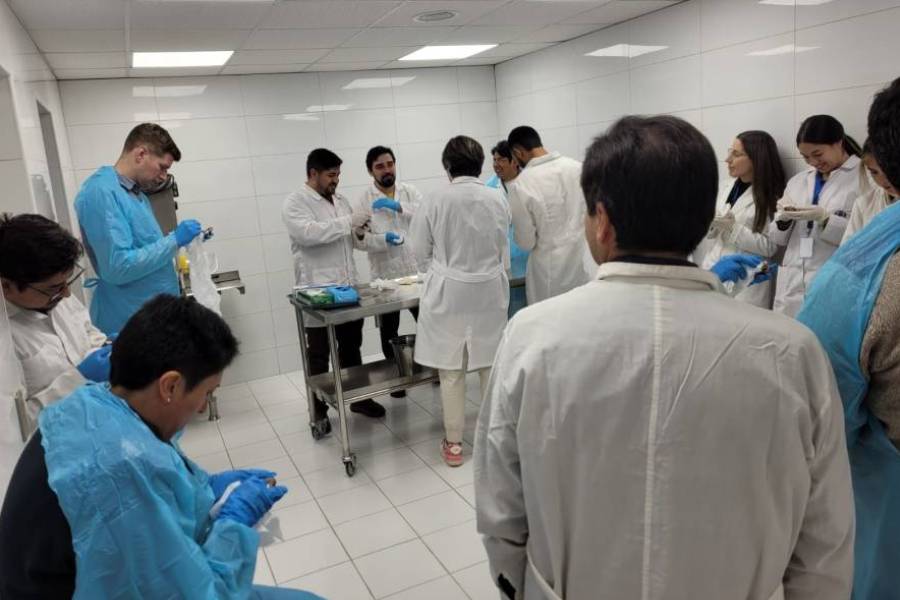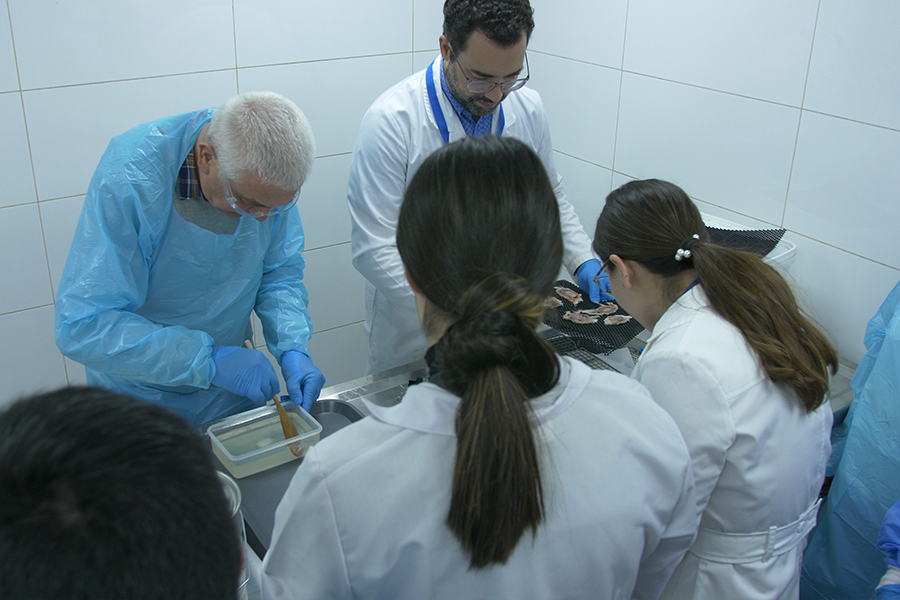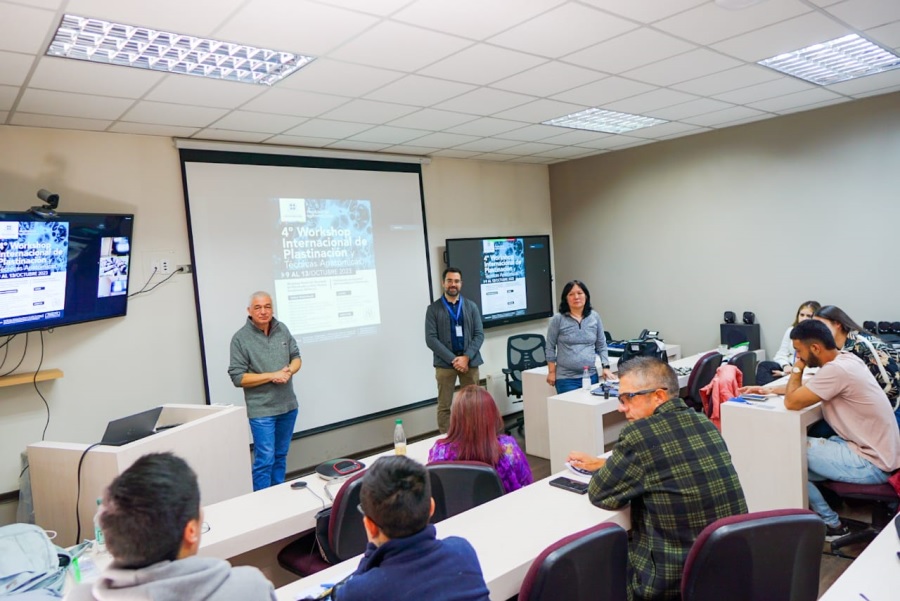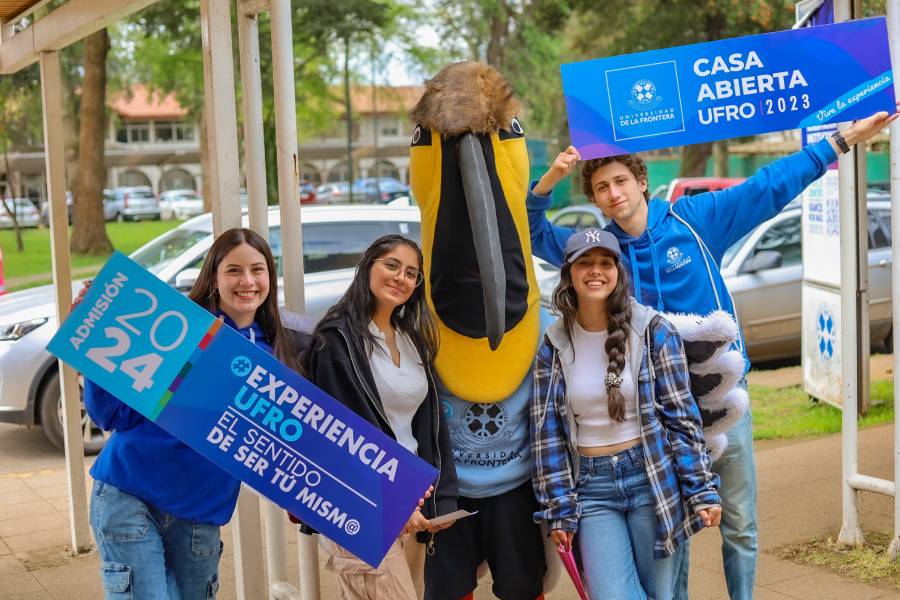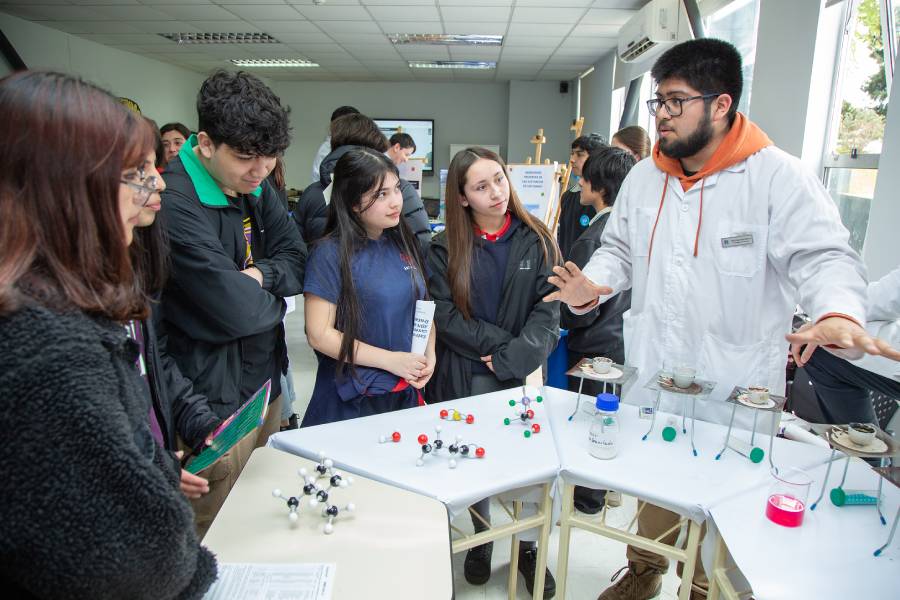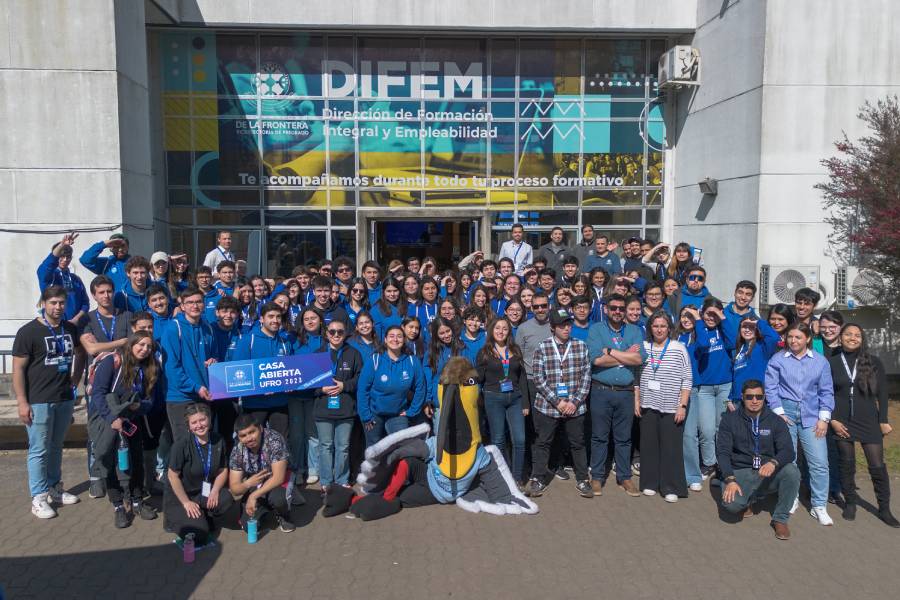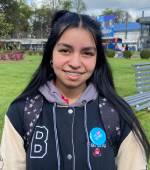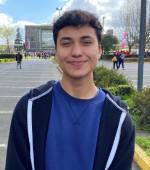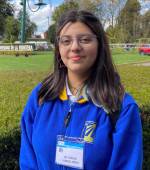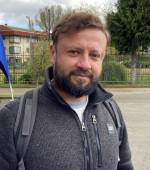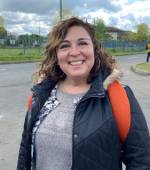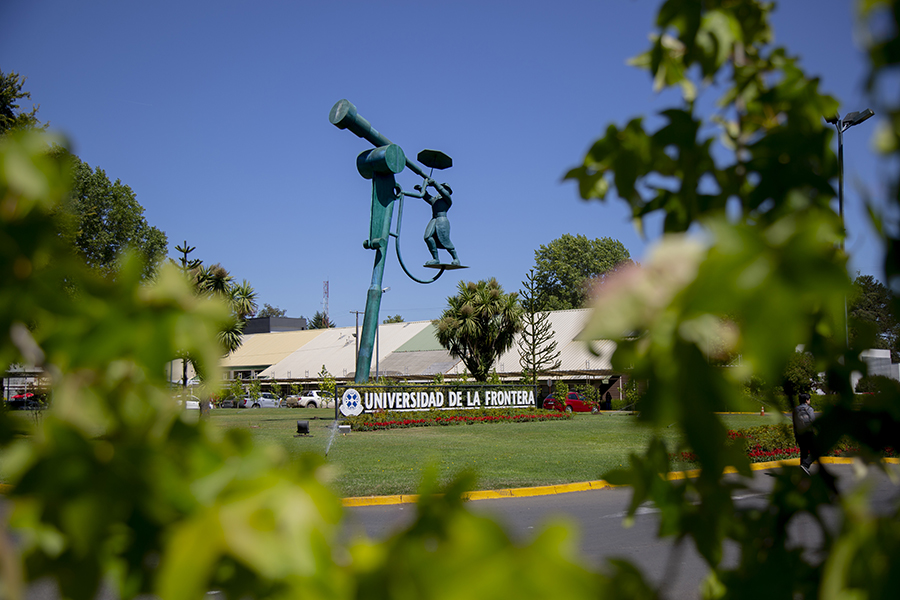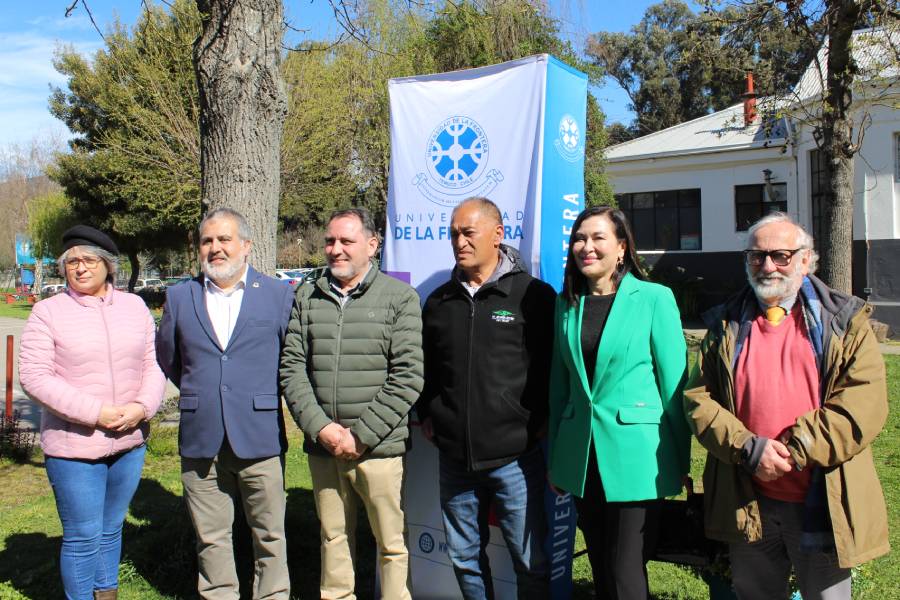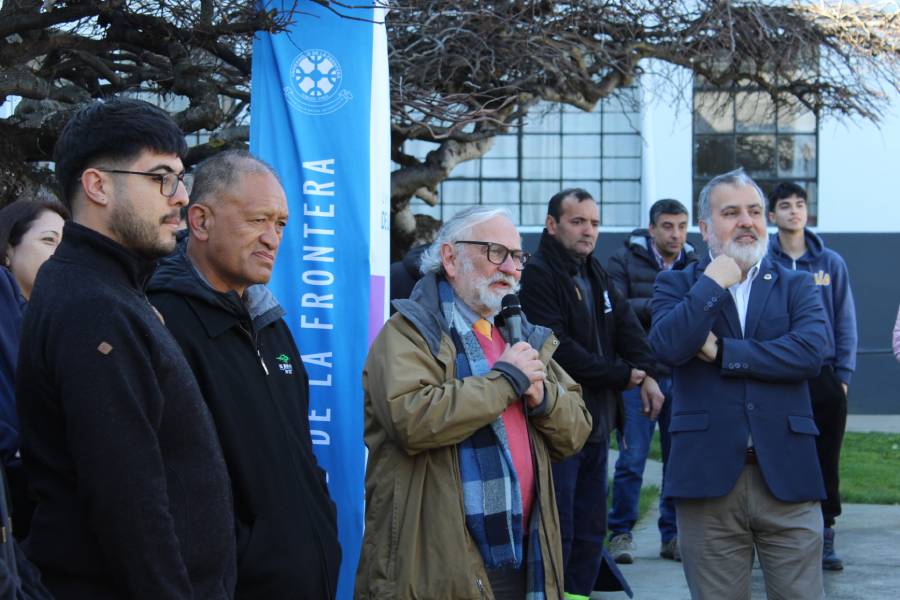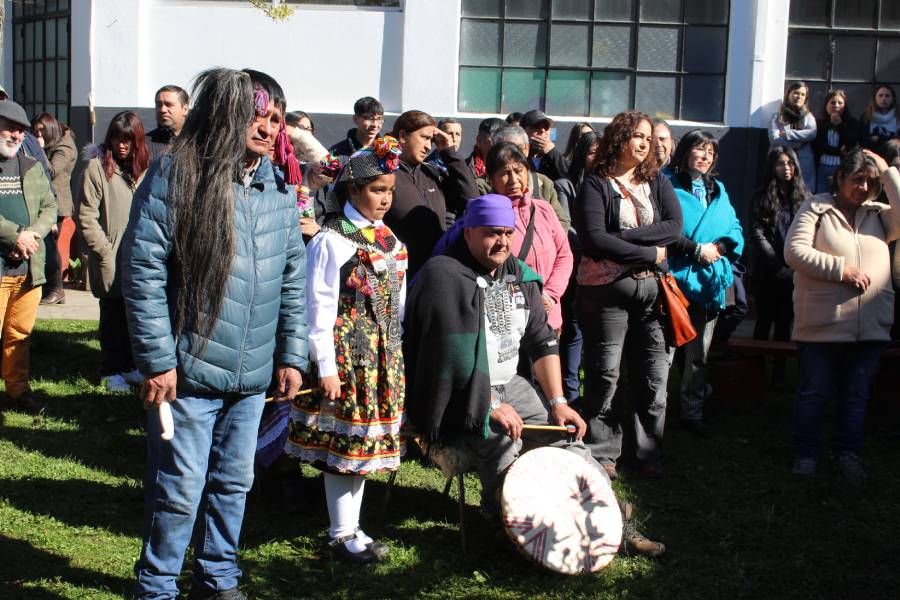|
AThe seminar was organised by the International Network for Digital Mental Health Promotion and Development of the Millennium Institute for Research in Depression and Personality (MIDAP) and took place at the Aula Magna of Universidad de La Frontera, providing an opportunity for updating and knowledge exchange on digital mental health. |
The increasing number of remote medical consultations during the COVID-19 pandemic was the starting point to analyse the challenges and opportunities in the use of digital technologies to reduce the gaps in mental health care. The international seminar brought national and international experts together at the Aula Magna of Universidad de La Frontera (UFRO), in round table sessions, interventions, and various presentations. The seminar “Digital Mental Health: Challenges and Opportunities in Chile” was organised by the International Network for Digital Mental Health Promotion and Development of the Millennium Institute for Research in Depression and Personality (MIDAP), a project financed by the Chilean National Agency for Research and Development (ANID). “It is important to have access – between not having and having digital access, it is always better to have a certain mental health support. In the particular case of Chile, which is a large and narrow country, access is difficult. It is very important to consider this fact so that all people throughout the country can have access,” explained Markus Moessner, Ph.D. in Psychology and associate researcher at the Centre for Psychotherapy Research, University Hospital Heidelberg (Germany), who was in charge of opening the seminar. According to Ricardo Araya, psychiatrist and academic at King’s College London and director of the Centre for Global Mental Health, the experience shows that there are many difficulties in meeting the needs of the population in terms of mental health solutions. In this sense, the digital era and technology allow to move forward and to close the treatment gaps. “The pandemic left us some positive things: it forced us to think about mental health services in terms of delivering remote help since it was not possible to meet in person. It was a stimulus to rethink the digital era and to make progress with its development. Things that were questioned before are now normal, such as talking to a doctor through a screen, which was not very accepted before the pandemic, but now it is very current, feasible and many patients even prefer it,” added Ricardo Araya, who also won the National Prize for Applied Sciences and Technology in 2022. ROUND TABLE DISCUSSIONS “We are very pleased with this activity organised by MIDAP and UFRO. It is always good to invite top-level guests and to be able to share presentations of this type with our students and with professionals from our region. You always have to try to update your knowledge and in this case, we have the possibility to get together with professionals from several universities. It proves the potential of collaborative work on a problem such as mental health, which is very important to solve in Chile,” explained the UFRO-MIDAP researcher Dr. Manuel Ortiz. He pointed out that future research on digital mental health could study and analyse the reasons why people access remote care options more or less frequently. “Remote mental health care is a viable, effective alternative for people to access care. We have to consider that we have a lot of technology, which we are more familiar with and which eventually can make this easier when being well used by the people,” Dr. Manuel Ortiz concluded. Escrito por: UFRO Communications Office
|
|
The activity took place at Universidad de La Frontera, with the participation of outstanding speakers and experts in the field of plastination. |
For one week, eighteen academics, health experts, professionals and graduate students from nine countries participated in the 4th International Workshop on Plastination and Anatomical Techniques of Universidad de La Frontera (UFRO), organised by the Laboratory for Plastination and Anatomical Techniques of the Faculty of Dentistry and the Centre of Excellence in Morphological and Surgical Studies (CEMyQ). The workshop had a theoretical and a practical part, in which outstanding speakers in this field of knowledge, such as Dr. Telma Masuko from Universidad Federal de Bahía (Brazil), and Dr. Volker Schill, from Biodur, von Hagens Plastination GmbH (Germany), shared their knowledge, as well as Dr. Carlos Veuthey and the director of the Laboratory for Plastination and Anatomical Techniques, vice president of the International Society for Plastination, and director of the workshop, Dr. Nicolás Ottone from Universidad de La Frontera (Chile). In addition, the professor Dr. Carlos Baptista from the University of Toledo, Ohio (USA), participated online, as well as the president of the International Society for Plastination, Dr. Dmitry Starchik. According to Dr. Ottone, “the plastination technique makes it possible to preserve morphological, anatomical, human and animal structures in a biosecure way and for an indefinite period of time, for teaching, research and outreach purposes. We addressed this technique in the workshop, with theoretical classes in the morning and practical classes in the laboratory in the afternoon, for one week. The students developed all plastination techniques with silicone, epoxy and polyester resins, and micro-plastination to obtain ultra-thin slices”. The first version of this workshop took place in 2017, after the implementation of the Laboratory for Plastination and Anatomical Techniques at UFRO. Since then, they organized four hands-on workshops, a certified course, and the 20th International Conference on Plastination. “This shows that our work is internationally recognised, not only in terms of preparing plastinated material for teaching purposes but also regarding our research, with more than twenty WoS publications in the field of plastination so far. Currently, I am also the vice president of the International Society for Plastination, where I was the secretary before. That also gives UFRO great visibility at the international level,” Dr. Ottone pointed out. PARTICIPANTS The participants came from Canada, the United States, Mexico, El Salvador, Colombia, Ecuador, Bolivia, Uruguay, and Chile this year. The Director of the Pathologists’ Assistant Program in the School of Health Professions at the University of Texas Medical Branch (UTMB), USA, Dr. Marcela Lizarraga, emphasised the quality of the workshop and the importance of this technique for teaching and research. “Plastination lasts forever. We still do cadaver dissection, but that lasts only a semester or a year. After that, we have to return the bodies because they are cremated. In turn, with this plastination technique, we can have specimens that last forever. In addition, the students can handle them without special precautions, because the technique does not require any toxic or chemical substances,” she explained. She was also pleased with the format of the workshop. “It is really good. I have the chance to ask questions about things I do not know. We are just starting with our laboratory, so I have many questions. Besides, here are experts for each phase of the process, so I can learn everything I need to get started,” she commented. It is worth mentioning that this International Workshop, organised by Universidad de La Frontera, is the only training programme for plastination and anatomical techniques in South America. Written by: Soledad Millapan Sandoval |
|
High school students and graduates from 110 schools participated in more than 140 activities to get to know the university, its campus, its programs, and all it has to offer. |
This year, Universidad de La Frontera (UFRO) received about eight thousand high school students and graduates from 110 schools from the Araucanía Region, Bio Bío Region, and Los Ríos Region at the Open House UFRO 2023. Activities organized by each of the 48 study programs, interactive presentations of the cultural and sports offer, guided tours, student development activities, live music, food trucks, and much more awaited the participants at the event, which was organized by UFROrienta, to show the high school students what it is like to study at UFRO. Early in the morning, the buses from different schools started to arrive at UFROs Aula Magna, where the students could register for the day and start to participate in the 140 activities that were easy to access, thanks to the maps, programs, and schedules the students received. To make it easier for the students to choose their future study program, they were able to participate in activities, such as surgical simulations or interactive physics experiments, organized by the different study programs of UFRO. Paula Hidalgo Sánchez, the Coordinator for Program Promotion and Dissemination commented: “It was a great experience! What caught the attention of the students was the diversity of activities and that they were able to actively participate. We are very grateful for the efforts of our faculties, study programs, sports teams, our teams of outreach and community engagement, the library, student development, DIFEM, student associations, our artistic and cultural groups, and everybody who contributed to this event that allowed to really get to know our university.” According to Pamela Ibarra, the Vice-rector for Undergraduate Affairs, the event was a complete success. “In this year’s version of UFROs Open House, we had many more participants than last year. We want to thank everybody involved in this event for their efforts and dedication – all teams, units, faculties, and the university community in general – who made this massive event a huge success,” she commented. EXPERIENCES
 Escrito por: Dirección de Comunicaciones Escrito por: Dirección de Comunicaciones |
|
“Chilean Scientific Production cited by Public Policy Documents” is the name of the report published by the prestigious publisher Elsevier, in which UFRO is ranked fifth among the universities with the highest social impact through their research. |
The SciVal platform carried out a detailed analysis of the performance of Chilean scientific productivity and its impact on public policies at the international level, based on data from 25,000 institutions in 230 countries. The report states that public policy documents from 115 organizations in 28 countries mentioned Chilean research papers in 2022. The Ranking specifies that 113 out of 178 documents correspond to publications in open access journals and 92 of them have less than 10 authors. Among these documents, 128 are scientific articles. It is also worth mentioning that 73% of these papers are part of the 10% of the most cited publications worldwide. This is where Universidad de La Frontera (UFRO) achieved fifth place in Chile, with the most scientific publications cited in international public policies. According to Dr. Rodrigo Navia Diez, the vice-rector for Research and Graduate Studies of UFRO, this is a very important achievement, since it reflects the impact of the work developed at UFRO. “The first thing I want to point out is that this is a global ranking with Chilean universities. That means that our research is recognized internationally. According to this, in average 4% of our published papers are mentioned in public policy documents around the globe, and in different fields of knowledge,” he explained. Among the fields of knowledge measured by the ranking, medicine stands out as the most cited field with 43%, followed by social sciences with 24.8% and environmental sciences with 20.4%. “This fifth place shows that we are a university with a high-level scientific production,” added the vice-rector. In this context, he also explained that the main actions carried out to strengthen the fields of research, innovation, and graduate studies at UFRO is the support of new researchers who develop lines of research with a global scope and social impact. The report specifies that the analysed Chilean universities published more than 500 documents in Scopus-indexed journals over the last five years (2018-2022), where UFRO stands out with 100 documents.
Written by: Vice-rectorate for Research and Graduate Studies |
|
The Māori delegation consisted of eight tourism entrepreneurs, ancestral leaders, and educational experts, who visited the Angol Campus of Universidad de La Frontera for an intercultural summit. |
Within the framework of the World Tourism Day, the Angol Campus of Universidad de La Frontera (UFRO) received the Māori delegation, which consisted of eight Māori leaders, who came for this historical visit to promote the understanding and cooperation between indigenous cultures: the Māori people from New Zealand and the Mapuche people from Chile. The summit started with a “Llellipún”, which is an ancestral ceremony in the Mapuche culture. It was led by the Mapuche leader (“machi” in the Mapuche language Mapuzungun) Marcos Millapi of the Chacaico community in Angol. This symbolically and spiritually rich ceremony served as a cultural bridge that connected the Māori community with the Mapuche community and the other attendees of the event. At the same time, the visitors performed the traditional “Pōwhiri”, a Māori welcome ceremony, which is a symbol of peace, respect, and mutual acknowledgement. At the event, it was also a sign of deep gratitude to the Mapuche community of Chacaico and the other attendees of the ceremony on the Angol Campus of UFRO. The Māori leader and tourism entrepreneur John Tapiata commented: “This gathering was a unique experience that reminds us of our home, since we respect our land and ancestors in New Zealand the same way as the Mapuche people here in Chile. We understand and see that our ancestors are connected with them and they are very happy with this gathering in Angol”. After the ceremonies, they got together for two meetings, organized by Angol Campus, the International Affairs Office, and the Department of Education of Universidad de La Frontera, in cooperation with the Malleco Chamber of Tourism. During these meetings, they emphasized the importance of this visit for the promotion of intercultural understanding and the cooperation in the fields of tourism and education. KNOWLEDGE EXCHANGE The first meeting took place with the Māori leaders and representatives of the local tourism industry, where they explored the cultural influence of the Māori and their experience in the field of tourism. They also discussed collaboration opportunities and shared ideas on how to promote and respect different cultures in the context of tourism. In the second meeting, the local community had the opportunity to learn more about the influence of the Māori people in the field of education. Therefore, the Maori leaders shared their experiences regarding the promotion of indigenous culture and education in New Zealand with the participating students and teachers from different schools in Angol, through a fruitful dialogue on how to strengthen the cultural identity through education. Sergio Bravo Pino, the director of the Angol Campus of Universidad de La Frontera, was honoured by the visit of the Māori delegation. “They came here to show us their experience regarding their educational system and how they approach tourism in their country, which is something that might be useful for the province of Malleco as well. We can really learn from them during this visit”, he commented. “It was a very emotional and meaningful day, and we are very pleased with the invitation of Universidad de La Frontera, who provided this space for cultural exchange in terms of tourism and education. Meetings like this allow us to learn from the experiences of other cultures and traditions”, explained Katia Guzmán Geissbühler, the director for Outreach and Community Engagement of the commune of Angol. During their visit, the Māori delegation also visited the Mapuche community of Chacaico and the Historical Museum Dillman S. Bullock of the commune of Angol, where they were able to immerse in the ancestral, cultural, and agricultural history of the commune. Written and translated by: UFRO Communications Office
|





